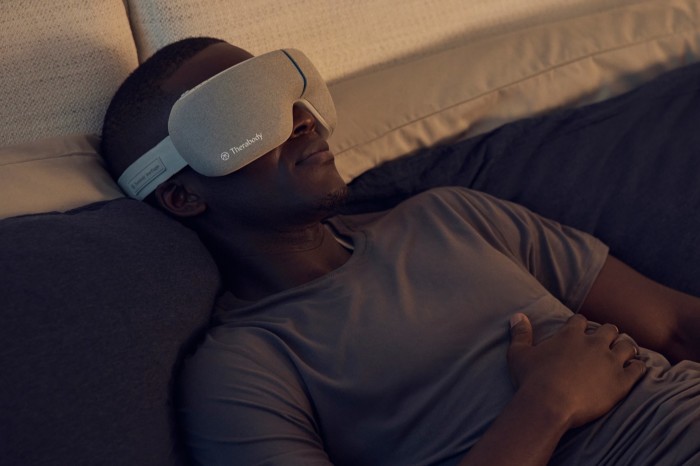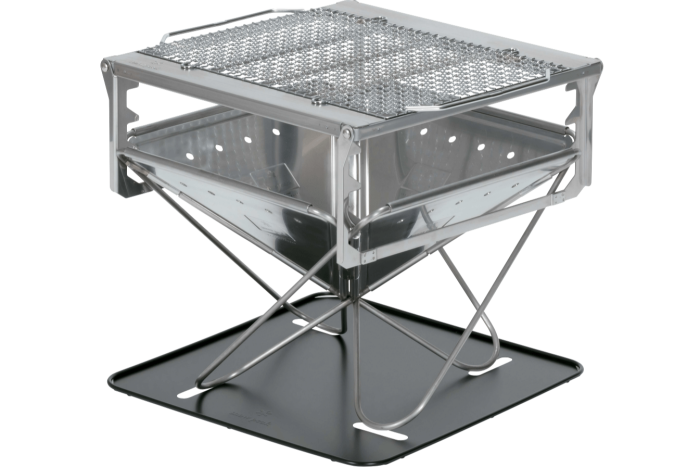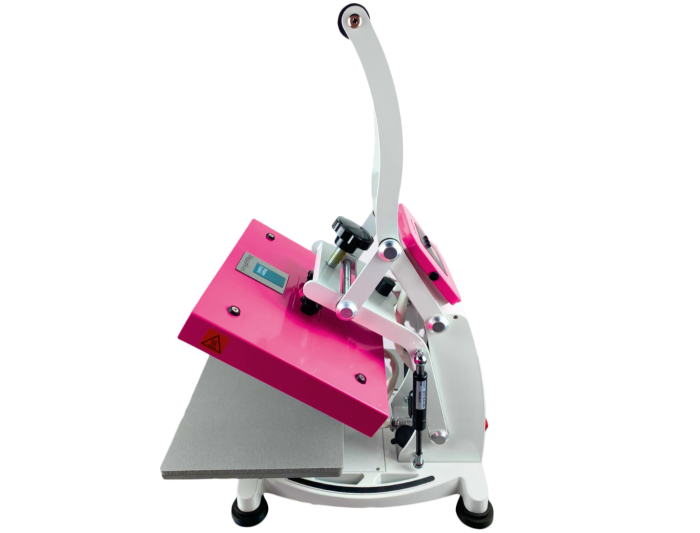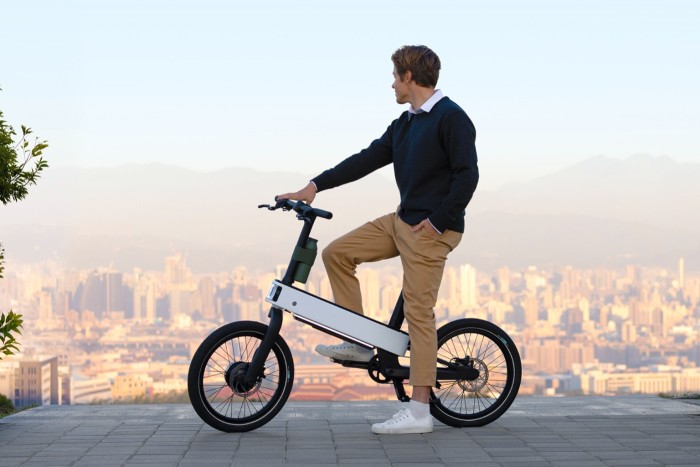The ultimate espresso machine

Faema’s award-winning machines have, for the past two decades, been made exclusively for the professional market. The Faemina marks the brand’s return to the home kitchen, and the highest possible grade of domestic coffee machine, based on one Italian company’s 75-year pursuit of the ultimate espresso.
It has a rock-solid double boiler (one for coffee, one for steam), an integrated water softener, a height-adjustable drip tray to achieve the perfect crema in your favourite cup, an optional Autosteam function (if your manual milk frothing isn’t quite on point) and an app that offers granular control of every aspect of the coffee-making process.
A Faemina-made espresso using Lavazza’s Great Marlborough blend (launched in November) is like no coffee I’ve ever tasted – sharp, sweet and with a spicy, wintry warmth. The machine’s skillset also extends to producing flawless filter coffee and, in an unexpected act of sacrilege, excellent cups of tea. Faemina from £4,570, faema.com Rhodri Marsden
The e-bike converter

My Dutch-style town bike hadn’t been ridden for about three years, but having transformed it into an e-bike using the Swytch kit (essentially a few cables, a motorised wheel, a pedal sensor and a clip-on battery), I’m now slightly besotted with it. I also sense that my car may be experiencing twinges of jealousy.
Swytch has been around for a little while, but its most recent iteration has seen a number of improvements, the most significant being its ridiculously small power pack. It gives a 10-mile radius on one charge, weighs just 700g and can fit into a (big) pocket. Swytch Kit, from £449, swytchbike.com RM
The all-terrain wheelchair

None of the founders of Swiss company Scewo knew what would ultimately unfold when, as engineering students, they collaborated on the design of a robot that could climb stairs. If their professor hadn’t suggested putting a seat on the robot so someone could drive it, the BRO may never have existed. But the result, six years after a prototype was first unveiled in an online teaser video, is an all-terrain, off-roading wheelchair – a product that could truly be described as life-changing.
It drives on two wheels, and is self-balancing – a little like a Segway – so you’re always upright while sitting on it. It climbs as many stairs as you like at a rate of 30 per minute – again, keeping you upright – with a rear-view camera so you can see what’s going on behind you. When you’re stationary, the seat can be raised by up to 89cm, bringing you up to eye level with people standing around you. And everything can be controlled either via the steering console or a smartphone app. Scewo BRO, from SFr36,000 (about £32,100) RM
The mega fridge

The NASA-grade air-purification system in the Sub-Zero & Wolf French Door Refrigerator + Freezer removes ethylene gases, mould and moisture every 20 minutes. The company claims lemons will keep for six months, strawberries for four weeks, and that if you cut an avocado in half and put it in, it’ll stay green. It stands 7ft tall, measures 48in across, has 607 litres of capacity in the fridge and 213 litres in the freezer.
An automatic “night mode” kicks in after dark, calming the lighting to prevent you being dazzled during midnight feasts. Nano-coated glass stops spills from spreading; instead, they hold their shape like blobs of mercury, just waiting to be wiped up. Its ice cubes are designed to fit perfectly in the bottom of an American whisky tumbler, and if you need lots, “party mode” bumps up the rate of production by 40 per cent. Open the doors, load up your weekly shop, shut them again, and it’ll be back down to 3ºC within a minute. Less decay. Less waste. Loads of room on the door for magnets. Sub-Zero & Wolf French Door Refrigerator + Freezer, £23,868 RM
The travel guitar

There are many grim stories to be told about the inherent fragility of the electric guitar. If they’re mishandled, they can break, and they enter the hold of an aircraft at their peril. The Ciari Ascender P90 Solo, however, is engineered to fold in half at the neck, slot into a backpack and be safely stowed under a seat. That it works at all is extraordinary, but the fact that it’s still pretty much in tune after unfolding and locking it back into place is mind-blowing.

Crafted by luthiers in Nashville and incorporating a Seymour Duncan P90 pickup, it’s a joy to play and a delight to show off. Satisfied customers include Andy Sneap (Judas Priest) and Shawn McQuiller (Kool & The Gang), so it’s pretty versatile, too. Ciari Ascender P90 Solo, $1,599 RM
The face massager

An abundance of skin devices have emerged to recharge both skin and mind, including Therabody SmartGoggles, whose heat vibrations massage the face. Massage causes a surge in the “happy hormones” dopamine, serotonin and oxytocin, which help the body cope with stress and improve memory, focus, and motivation. Therabody SmartGoggles, from £174 Adeela Crown
The easy-clean juicer

Juicers are bought with the best of intentions, but the tedium of prepping and cleaning can often see them shoved into dusty cupboards. Initially, there’s nothing to suggest that the REVO830 will be any different, with a load of parts that scream “maintenance”. Once assembled, however, it’s a joy to use and a cinch to clean. You can lob whole fruit and veg into the feeding tubes, with juice emerging from one chute and pulp from another. Most parts can be rinsed clean, and the one that needs proper scrubbing – the strainer – comes with a rotating brush that removes stubborn pith in seconds. Minimal faff, maximum juice. Kuvings REVO830 cold press juicer, £549, ukjuicers.com RM
The Botox alternative

At-home devices such as the GloPRO Microneedling Regeneration Tool by Beauty Bio create controlled micro-trauma to the skin, whose healing process kickstarts collagen and elastin synthesis in the dermis. This gives strength, support and resilience to the skin. Beauty Bio GloPRO Microneedling regeneration tool, £199, harrods.com AC
The match-your-decor speaker

Some speakers sit on shelves, others are mounted on poles or embedded in the ceiling, but the Bang & Olufsen Beosound A9, now in its fifth generation, is literally part of the furniture. Its exterior can be customised to your decor, while its electronics give a rock-solid bridge to your WiFi network. Yes, you can use it via Bluetooth if you really must, but given its high-spec connectivity (branded “Mozart” by Bang & Olufsen) that would be like hammering out Chopsticks on a Bösendorfer grand piano. WiFi (or cabled ethernet if you prefer) provides you with Airplay 2, Chromecast, Spotify Connect, Tidal Connect, B&O’s own software – and, if you’re lucky enough to have two A9s in a single space, native stereo pairing. Plug it in, detect it via the B&O app, and it’ll quickly do a tonal sweep of the room to establish frequency peaks and troughs, adjusting its EQ accordingly. You can adjust the balance of the sound via the app, but the initial tonal sweep does a superb job and it doesn’t really need adjusting. Volume can obviously be boosted remotely, but also by swiping across the top of the disc. Bang & Olufsen Beosound A9, £3,199 RM
The portable barbecue

This packable grill will allow you to channel your inner Francis Mallmann. Snow Peak stainless-steel Takibi grill, £343, snowpeak.com David Coggins
The assistive lipstick applicator

For years, people with limited mobility in their hands and arms relied on ingenious hacks to apply make-up, a surefire indicator that the beauty industry wasn’t giving them enough thought. This, however, is not a niche problem: L’Oréal reports that one in 10 people in the US has limited motor ability, be it from cerebral palsy, stroke, Parkinson’s or arthritis. Hapta, unveiled this year at the CES tech trade fair in Las Vegas, is a beautifully designed lipstick applicator with sensors to ensure that it is kept at the correct angle to the face, no matter how it’s being held. L’Oréal Hapta, price still to be set RM
The pocket laptop

This dinky 7in mini-laptop is fully modular, upgradable, repairable and ultimately recyclable. It’s a Linux machine, so you’ll need workarounds for unsupported software you’re used to running on your PC or Mac, but it has broad appeal; it’s super-portable, easier to work on than a tablet or smartphone and has a decent spec for its size: a quad-core processor, 8GB of RAM and lots of connectivity, including USB-C, HDMI, micro-SD, WiFi and Bluetooth.
It also has a whiff of exclusivity, with each machine hand-assembled in Berlin. $1,399 gets you the higher-spec version with a 1TB SSD and a plush white Piñatex case (a vegan textile made from waste pineapple leaves, don’t you know). MNT Pocket Reform, from $999, crowdsupply.com RM
The full-scale “RC” car

The Little Car Company has made its reputation by producing beautifully detailed, scaled-down versions of classic cars: battery-powered Aston Martins, Bugattis and Ferraris that can be driven by kids (or small adults!) on private land. But for its latest project this idea was flipped on its head: what if you took a popular remote-control car from the ’80s and scaled it up to produce a road-legal vehicle?
The RC it chose was the Tamiya Wild One 58050, originally launched in 1985 and much loved for its indestructibility (to a point) and ability to deal with difficult terrain. It featured a driver sitting at the wheel, but when scaled up it became clear there was insufficient room for their legs, or indeed their head. (Not ideal.) The original had no windscreen, which clearly wouldn’t meet safety standards, and nor would the bonnet spotlights masquerading as headlamps. But the company’s design team succeeded in constructing a road-legal car, 3.6m long, which to all intents and purposes is a Wild One replica. It’s powered by eight removable battery packs with a total capacity of 14.4kWh, and has a top speed of around 50mph (the original RC whizzed around the park at 20mph). Little Car Company Tamiya Wild One Max, from £35,000 plus VAT, wildonemax.com RM
The personal safety alarm

Wing is a personal safety device that’s small, extremely loud (120dB) and can send alerts to friends and family if you find yourself in an emergency. It’s the younger cousin of the wrist-mounted Run Angel, and can be clipped to clothing, bags, belts and so on. Charge it up, connect via Bluetooth to the accompanying app and add up to three “guardians” who’ll be informed via SMS and email when the alarm is activated. That’s done via a button press, which instructs your phone (which has to be nearby) to send out the alert; a double press will send it without an alarm, if discretion is important. The alert has the date and time of the activation, and a link to a map showing your location. Run Angel Wing, £94 RM
The T-shirt customiser

Getting custom images onto fabric requires heat, whether it’s transferring them from vinyl or paper, dye-sublimation or curing screen prints. Domestic irons are one option that most of us have to hand, but they don’t give the consistent temperature and pressure you need to ensure that your designs stay put. The HappyPress is made by Stahls’ (industry heavyweights of custom apparel) and it gives you precise control over heat, pressure and timing across an A3-sized bed – perfect for T-shirts, tote bags and any flat pieces of fabric. HappyPress 4 A3, £435 RM
The AI bicycle

You may associate Acer with budget laptops, but it has a subsidiary, Xplova, dedicated to cycling computers, and some of that tech has found its way into this ebike. The ebii (rhymes with “TV”) works in tandem with an app (ebiiGO), using AI modelling to provide more power when you need it based on cycling conditions and your technique.
It can also intelligently conserve power to make sure your battery doesn’t die halfway through a journey. Collision detectors, automated lighting (front, back and sides) and security features (automatic locking when you walk away) make it a perfect urban getabout, and at a lean 16kg it feels more nimble than its heftier competitors. Acer ebii, €1,999 RM
The satellite link

Dead spots in mobile coverage can mean business-critical messages popping up on your phone a deal-breaking 30 minutes late. The Defy is a small, lightweight Bluetooth device that brings satellite connectivity to any iOS or Android smartphone. In conjunction with the Bullitt Satellite Messenger app, it provides a seamless bridge between mobile and satellite networks, so you can be contacted wherever you have a view of the sky. (The price includes a 30 messages-per-month subscription.) Motorola Defy Satellite Link, £159, motorolarugged.com RM
The mini chain saw

I can’t be the only one to find mini-chainsaws satisfying on a purely aesthetic level, but this model from Husqvarna is particularly well-designed, intuitive to operate and safe to handle. Its primary function is garden pruning, which it does with speed and efficiency. When it’s on the end of its adjustable 1.7m pole, jobs that previously involved teetering on a stepladder become a whole lot easier – almost pleasurable. Out of curiosity, I used it to cut a pallet in half to fit in the car, and that was a cinch too. Added bonus: it’s part of the Power For All Alliance, which means it’s compatible with a range of batteries and chargers from other brands, most notably Bosch. Husqvarna Aspire PE5-P4A mini-chainsaw, £289 RM
The picnic pot

These Hydro Flask food jars are perfect when travelling or for picnics. They keep pasta dishes warm, or berries and yoghurt cool in the summer heat; the wide neck means you can eat straight from them; and they’re easy to clean too. Plus they’re completely leak proof and available in four sizes, the largest of which would probably feed all the family. Hydro Flask food jars, from £34.49, amazon.co.uk Fergus Scholes
The ear plugs

The original Kokoon Nightbuds were a fantastic idea let down by poor build quality (I got through two pairs and ended up having to turn them on using a mini screwdriver). Thankfully, the involvement of Philips has seen those problems evaporate. I genuinely couldn’t sleep without them. Philips Kokoon earbuds, £199.99, kokoon.io RM
->Google Actualités









